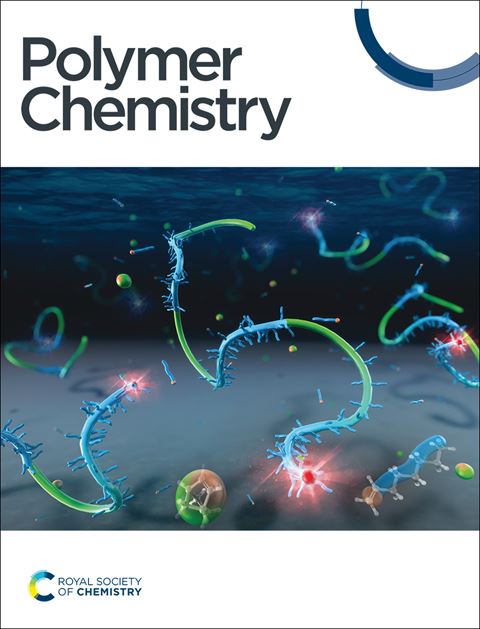Reactive Oxygen Species Sensitive Thioether-Bearing Poly(2-oxazoline)s: Direct and Controlled Polymerization using Initiator Salt.
IF 3.9
2区 化学
Q2 POLYMER SCIENCE
引用次数: 0
Abstract
Reactive oxygen species (ROS)-responsive polymers have attracted significant attention for their potential in biomedical applications, particularly in drug delivery and tissue engineering. This study presents the first direct synthesis and characterization of ROS-responsive thioether-bearing poly(2-oxazoline)s (POx) via controlled cationic ring-opening polymerization (CROP). While typical initiators lead to loss of control over the CROP of 2-(methylthio)-methyl-2-oxazoline, its controlled polymerization was possible via the initiator salt method. The living character was confirmed by kinetic experiments and chain extension, used to synthesize amphiphilic block copolymers. The ROS-responsiveness of the synthesized polymers was evaluated through in vitro studies in the presence of hydrogen peroxide. The amphiphilic self-assemblies disassemble over time, as demonstrated for a triblock copolymer, suggesting a significant change of hydrophilicity of the polymer upon exposure to ROS. Together, the presented synthetic approach has much better atom economy over a previously published approach and enables easy access to ROS-responsive POx with complex architectures.活性氧敏感型含硫醚聚(2-恶唑啉):引发剂盐直接控制聚合。
活性氧反应聚合物因其在生物医学上的潜在应用,特别是在药物输送和组织工程方面的应用,引起了人们的极大关注。本文首次采用可控阳离子开环聚合(CROP)直接合成并表征了具有ros反应的含硫醚的聚(2-恶唑啉)s (POx)。虽然典型的引发剂会导致2-(甲基硫)-甲基-2-恶唑啉的CROP失去控制,但通过引发剂盐法可以控制其聚合。通过动力学实验和扩链实验证实了活性,并用于两亲嵌段共聚物的合成。在过氧化氢存在下,通过体外研究评估了合成聚合物的ros反应性。如三嵌段共聚物所示,两亲性自组装体随着时间的推移而分解,表明暴露于ROS后聚合物的亲水性发生了显著变化。总之,所提出的合成方法比以前发布的方法具有更好的原子经济性,并且可以轻松访问具有复杂体系结构的ros响应POx。
本文章由计算机程序翻译,如有差异,请以英文原文为准。
求助全文
约1分钟内获得全文
求助全文
来源期刊

Polymer Chemistry
POLYMER SCIENCE-
CiteScore
8.60
自引率
8.70%
发文量
535
审稿时长
1.7 months
期刊介绍:
Polymer Chemistry welcomes submissions in all areas of polymer science that have a strong focus on macromolecular chemistry. Manuscripts may cover a broad range of fields, yet no direct application focus is required.
 求助内容:
求助内容: 应助结果提醒方式:
应助结果提醒方式:


